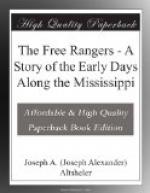“I shorely do mean it. All the boats that they expect to use to-day wuz anchored in the bi-yoo or hay-yoo or whatever they call it. ’The Gall-yun,’ our gall-yun, wuz at the end o’ the line nearest to the big river. Nobody wuz on board, but she wuz tied to the boat next to her. I slipped on her—it was pow’ful dark then an’ the Spaniards wuz keepin’ a slip-shod watch, anyhow—cut the rope an’ floated her down the stream, where I’ve tied her up under sech thick brush that nobody ’cept ourselves is likely to find her. She’ll be thar, waitin’ fur us, an’ don’t you doubt it. An’ fellers all our rifles an’ ammunition an’ things are on her. It wuz the captain’s boat, an’ I s’pose he thought he might ez well hev them trophies, an’ use ’em.”
“Is this really true, Sol?” exclaimed Paul, although he did not doubt.
“Gospel truth. We’re jest ez well off ez we wuz afore we wuz captured. I don’t think, either, them Spaniards will miss ‘The Gall-yun’ until mornin’. So we kin be up an’ away with somethin’ o’ a start.”
“Lead on, Sol,” said Henry.
Sol led, and resumed the noiseless Indian file. They found the good ship, “The Galleon,” under the overhanging bushes where Sol had left her, and rejoicingly they took possession again of the boat, their arms, and supplies.
“Now for New Orleans and the Governor General,” said Paul, as they pushed out into the bayou. There was no current here, but their powerful arms at the oars soon sent the boat into the Mississippi. There they set the sail which had been left unchanged, and as a good wind caught it they went on at a quickening pace. Wind, current, and oars combined made the low banks pass swiftly by.
It was now the darkest hour and all things were veiled. Each felt a great satisfaction. They had the courage, after such a great and skillful escape, to attempt anything.
“It’s only lately that I’ve been gittin’ friendly with the Missip,” said Shif’less Sol. “It’s a pow’ful big river an’ a new one, but me an’ this river are already jest like brothers. It ought all to belong to us people o’ Kentucky. When we git to be a great big settled country, hev we got to float everything down it, right in among the Spaniards or the French, an’ they able to stop us ef they want to? ’Pears to me thar oughtn’t to be anything but a string o’ free countries all along the length o’ this big river.”
“I think that is what is likely to happen,” said Paul looking into the future, as he did so often. “We’ll always be pressing down, and we can’t help it.”
“Anyhow,” resumed Shif’less Sol, “I’m glad that we’ve left that thar place o’ Booly, or Bee-yu-ly, or whatever they call it. Funny these furrin’ people can’t pronounce names like they spell. Now we Americans, an’ the English, who use our language, call words jest ez they are, but you never know what a Frenchman or a Spaniard is goin’ to make out o’ ’em.”
They made good progress throughout the day, and saw no sign of the flotilla of Alvarez which they had feared might overtake them. They were agreed that it would be wise for them to reach New Orleans first, and hence they went boldly forward into the country that they regarded as that of the enemy, confident of their fortune.




